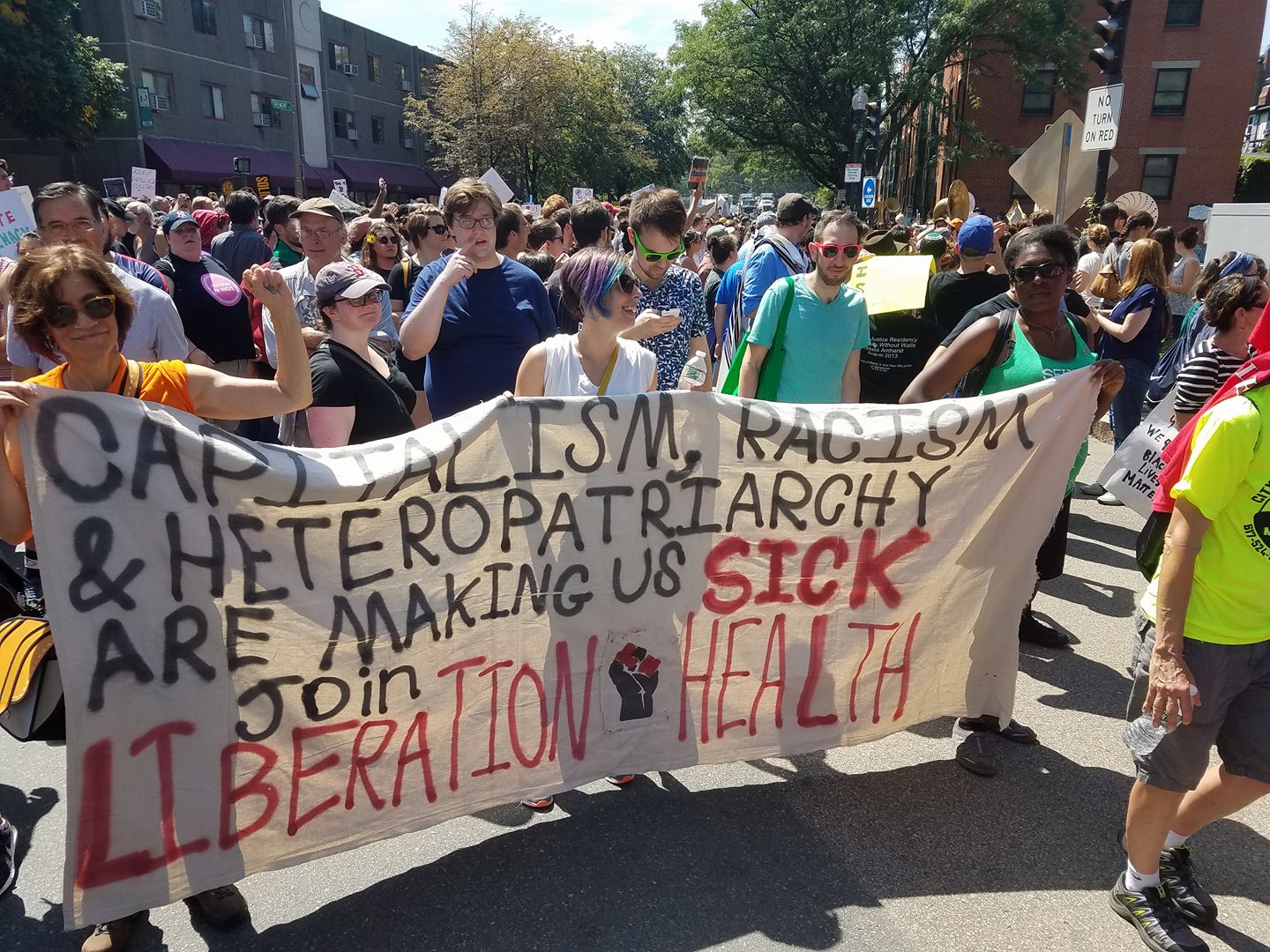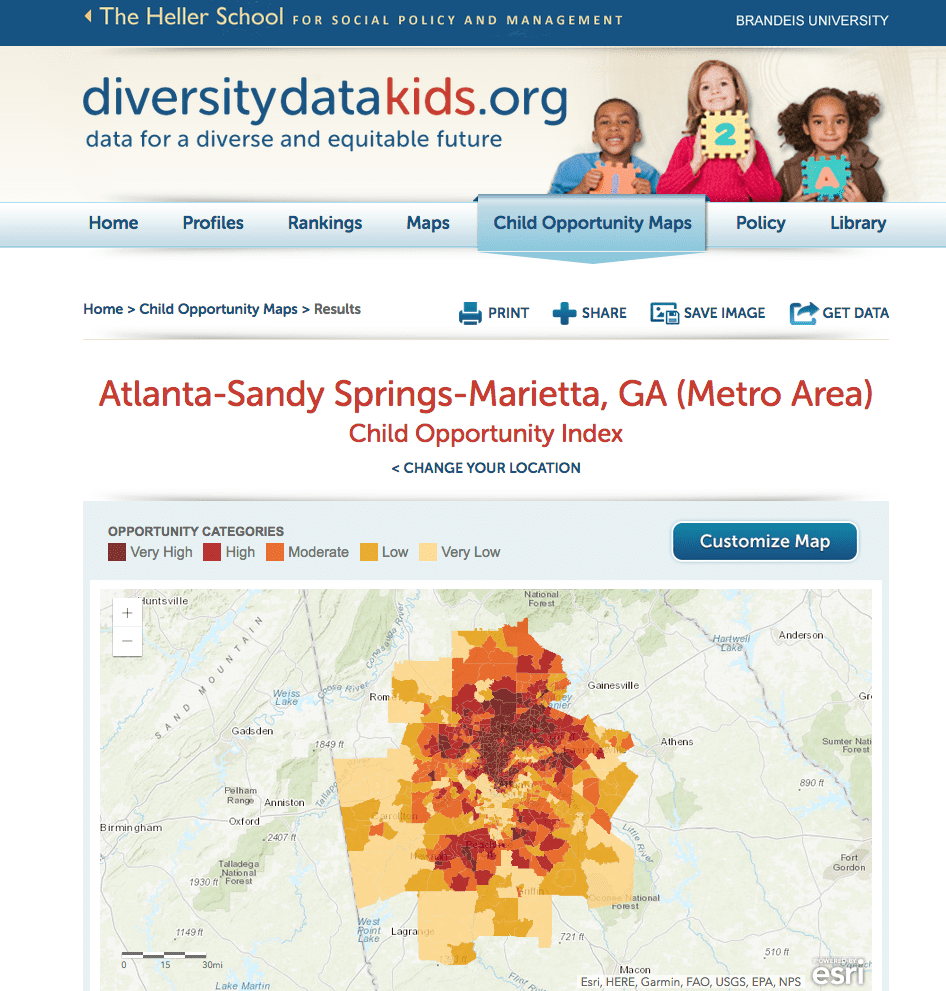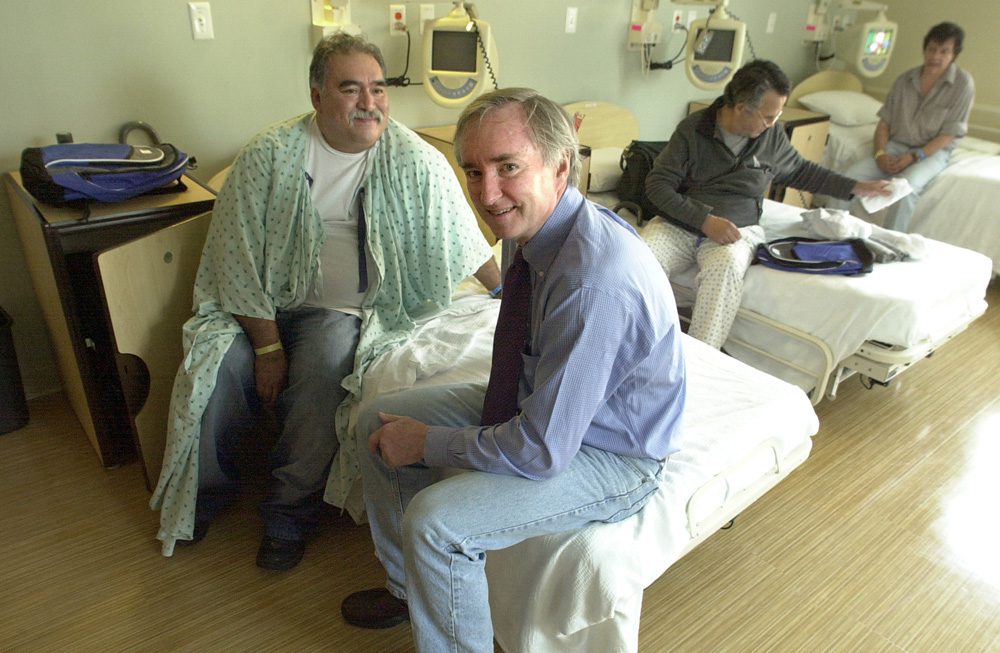
Members of Boston Liberation Health, advocates of social justice and human liberation, gathered this past summer with thousands of people who marched in protest of a white supremacist rally. Photo courtesy of Boston Liberation Health
Dawn Belkin Martinez is a clinical social worker and professor at Boston University School of Social Work. For many years she has worked closely with the housing justice organization City Life/Vida Urbana, and explored the ways that social justice, organizing, and mental health interact. We talked with her to hear more about what she’s learned and how it could be more broadly applied.
Miriam Axel-Lute: What got you looking into the topic of organizing and health?

Dawn Belkin Martinez. Photo by Frank Curran for Boston University Photography
Dawn Belkin Martinez: I was involved in organizing way before I was a social worker. I could see from my work in the Southwest that people’s personal problems were directly related to the cultural messages they were receiving about race and class and gender and all those sorts of things, and then the institutions that they interfaced with. What I observed [was] the more involved people were, the more together they seemed. They got a lot of support from being in the group.
When I moved to Boston [and] went to graduate school, I was still involved with housing organizing through City Life/Vida Urbana, and it became clear that there was a real connection between people [who] were involved with some organizing and how they felt. Not everyone, obviously, but you’d notice it.
I was really interested in developing two things that went along side by side. One was a model of therapy that acknowledged [oppression and political context]. I’m not a trained organizer. I’m a clinician, a therapist. But the limits of traditional therapy to me were clear. At least the way I was trained, you weren’t really supposed to talk about those kinds of things unless the client brought it up.
And I just disagree with that. You always have an opinion. It’s just if it’s status quo or not. Usually when social workers in a hospital introduce the idea of medication, they’re introducing the idea because the psychiatrist thinks it’s a good idea. It’s their opinion. It’s not the opinion of the patient. I personally don’t see any difference between that and introducing ideas about race and class and gender and so on and so forth.
So we developed a model of practice called the Liberation Health model. We wrote a book, and we’re now teaching the model all over.
Along with that, I was really interested in [not] just that organizing seemed to be good for people, but what was it about organizing that seemed to be good for people, and, more importantly, was it every kind of organizing. That was actually my dissertation. It’s a small qualitative study, but it looked at a group of Latino activists, immigrants in particular, [who] were involved in one particular organization. And we talk with them about their experience and what they got out of becoming an organizer.
It was really small, so you can’t generalize, but the results were quite astonishing. One person actually said, “This is my medicine.” I mean, she does have a very serious medical illness, and the doctors are constantly telling her to take pills and things like that to cope with the psychological effects of the illness. And she says she doesn’t do any of that. She just goes to her meetings and things. I’ll never forget that. I can remember that moment, sitting there with her, my eyes filling up with tears, like wow, that’s incredible.
There are different themes that we were able to distill from our conversations with people about what organizing did for them. The main thing is that it gives a lot of people very concrete skills that they didn’t have before, so you learn things like how to speak in public. For the people I interviewed, many of them had experiences of racism. They were feeling very disempowered and with low levels of what the social psychologists call causal importance, or self-efficacy, things like that.
Just the fact of this person [who] was so accustomed to the racism and classism that they have to experience on a daily basis, getting up in a meeting and talking to an official, or somebody they deemed as having a lot of power and authority, and they felt they were able to do it.
Interestingly enough, some of the feedback I got from people was particularly gender-based, because the men talked about these concrete skills. That was the first thing they mentioned. “I learned how to write a letter.” “I learned how to be able to speak in a group.” Or things like that. The women I focused much more on “El poder de la solidaridad,” the power of solidarity, what they got out of being with other women and the connections and the strength they felt internally as a result of being with other people that validated them and supported them.
And the other thing I think that it did for people was it gave them an identity. “I’m an activist in the world.” I’m not just somebody [who is] cleaning, or something like that. I’m an activist. And that sense of identity made them feel great and had a positive impact on their sense of what we call psychological empowerment, the idea that you can act on the world.
That makes a lot of sense. And what sort of organization was it that you were studying?
It was a housing organization. It was clear that it had to be a community grassroots organization. It wasn’t just an organization where people were told what to do and then executed what they were told. The type of organization mattered. It was democratic, participatory. It was an organization where people actually decided the agenda, and not just the agenda for a meeting, but the agenda of the campaign, or whatever they were doing. Organizations that had a set agenda, and people were followers, so to speak, didn’t do that for people in the same way that the grassroots organization did.
Did you actually study organizations that approached that a different way?
The qualitative study was based on one particular organization. But before we did the qualitative study, we were looking at different organizations, yes.
Tell me a little bit more about the Liberation Health model.
The Liberation Health model is pretty amazing. We’ve done a lot of work [with] City Life/Vida Urbana utilizing the model. The model was developed collaboratively with clients. What we wanted to do was figure out how do we talk about things like race and class and gender and individualism and consumerism with the people we were working with. That’s not what people think about when they come to a therapist. They’re usually focused on all of these internal factors, like “My mother was mean to me,” or, “My dad left me,” and things like that. Not that those things don’t influence things, but they’re also influenced in conjunction with these other factors around race and class and individualism.
So we figured out a tool to discuss these sorts of things. The tool that we finally landed on, which is called the Triangle, went through maybe six iterations, because we were coming up with models that were very complex. And the families we work with didn’t really like those complex models. We finally landed on this triangle. And we would put the problem they were presenting with, let’s say depression or anxiety, in the middle of the triangle, whatever they said, whatever words they used to describe their problem. And then, we would talk about the personal, the cultural, and the institutional factors that were influencing their problem.
Personal are the things that you traditionally think about, like development or any kind of illness, or abuse, or loss, trauma, things like that. But then the more complex part of it is the second two parts of the triangle.
What were the messages people received that would be influencing their problem? What kind of messages do we get about aggression? What kind of messages do we get about how boys are supposed to behave? What kind of messages do we get about if you have problems, do you seek out other people? Do you try to find and fix it yourself? Individualism, racism, classism, consumerism, professionalism, what we call dominant worldview messages, how do they influence the problem?
And finally, we talk about the institutional factors that influence their problem. All of these different toxic ideas influence the kind of institutions we have right in this country … the housing system or the court system, or the healthcare system. And we explain to people that the factors are not mutually exclusive, that they drive each other. So, for example, if you believe in individualism—people are supposed to do things on their own, you’re not supposed to help them and things like that—you’re going to have a healthcare system that doesn’t respond to people, right, which is what we have, and that factor will influence how you’re feeling. So each side of the triangle drives the other side. It’s this kind of vicious circle, or triangle.
And that model, oh, my God, I can’t tell you how much people clicked with it. It was just like, yes! And especially when we started doing work in a housing organization, because particularly around things like foreclosure or eviction, people blamed themselves and they think, “Oh, I must have done something wrong,” or, “I’m so stupid, I didn’t read all of the papers they had me sign,” or, “I’m not competent enough to keep up with things.” But, once you triangle the problem and you say, “OK, so how do you think race influenced what happened with your house? Let’s look at all the people [who] lost their house. Oh, they’re Black.
Then you talk about how the institution, the banks and all that, and then people are like, “Shit.” And it’s really cool. At City Life, there was a man [who] worked there, Jim Brooks. He was amazing. And he would always say, “At City Life, you check your shame at the door.” Because so many people come in with so much shame and embarrassment about what happened. And when you start to deconstruct it using this tool, people become like, “Wow, it’s not just me. This whole thing was working to get people like me sort of screwed.” It’s really amazing and empowering for people. And people will say, “Maybe I didn’t get my home back, but I got my dignity, and I got my sense of worth.” And it just blows you away.
The model is simple enough that people can kind of get it right away. We go all over and teach this model. And I think it’s fair to say that we’re having a small influence in the way social workers do their work. Social workers are supposed to be very cognizant of this. This is what makes us different from the other mental health professions. We have this strong commitment to social justice in our code of ethics.
That’s so wonderful. How do you see a good relationship between social workers and a Liberation-oriented mental system and organizing groups?
We see ourselves as collaborators and allies in the struggle for justice. I think that the groups—City Life is a good example—see us that way and rely on us to help them through difficult times. So, for example, just the other day, someone from City Life called me and said, you know, we’re going to be discussing the march [against white supremacy in Boston], and people might have strong feelings about what happened. Can you just come down just in case we need you? And I couldn’t, but I talked with that person, and said, OK, so if people have these feelings, how can we remind them that this is about the systems we have, and so on and so forth. I basically coached that person about how they could respond if somebody had a hard time.
Other times we’ll go there and we’ll have a group. I worked with the bilingual group [at City Life] for quite some time. People really liked it. It was an opportunity for them to talk about how the stress of their eviction and foreclosure, and rent increases was affecting them, and having this kind of comprehensive response around the triangle. Basically, OK, so what kind of messages do we get, and how does that affect you? And it was really cool, because it kind of felt like I just was a minor facilitator. They had mastered this stuff so much that they would be offering suggestions to each other, like when you get really down, how do you think about it differently, and how do you not let that regular “The Man” message [into] your head.
Our role can be one of consultation to both the clients of the agencies, or participants and the activists themselves because you can really burn out doing this stuff. You can start to feel lots of the effects of the people that you’re working with like overwhelmed, anxious, stressed. To me, activist support has to involve the triangle. It has to involve understanding all these things, individualism, particularly for activists. What I see is that people start to feel a sense of failure if they can’t stop capitalism. Or, “Oh, my God, I’m not doing my job well. I’m not able to get this person back their house. They’re going to be evicted. I feel like I can’t do my job.”
And that’s individualism, because what’s going to change our society is the movement. It’s not going to be an individual. And so, how can the activist sort of maintain that and remember that so they don’t take these individual losses—not to minimize how profound those losses are—as a reflection of them not doing their job?
So, you come in and do some group sessions at the invitation of the organization. They have a budget line for social work?
It depends on what we’re doing. For City Life, we’ve never gotten compensation [except] for one specific thing that we did with the staff because there was a grant. And then the rest, all of the other groups that we’ve done, we have a group of people. We’ll post something on our Facebook page, “Can somebody go to City Life and help with this?” Recently, I guess about a month ago, they had a problem with a situation, an individual participant in City Life, and they were really at a loss. The Liberation Health Group has 800 people all over the country, so we just put out the call, “We need some social workers that have experience with the elderly.” Within maybe a day or two, there were six people that said, “Hey, I can do this.” We set up a conference call. We discussed the case, and then shared the recommendations with our colleagues at City Life. And that’s all. We don’t get compensated for that. It’d be great if we won some awards and we could start doing this on a bigger scale.
Have you ever done anything with people or organizations that do financial counseling? It fits what you’re talking about exactly—personal factors and how they manage their money, but there’s also all these institutional factors that got them trapped in a payday loan and all these beliefs.
Yes, and consumerism, right? It’s like you are what you own in this country.
It seems like a perfect place for this approach.
We have not. We’ve never been asked or approached about that. But, yes, I mean, my God, anyone [who] only thinks that it’s the individual’s problem about spending habits is just missing the boat, because everything about our society and how people are messaged is about consumerism. When we were doing the Triangle with a family, there were two boys, and they were [there] for aggressive behavior. They called it the hitting monster.
And one of the things that they got into a lot of conflict with their mom about was that she never had enough money. They wanted the really fancy sneakers, and she couldn’t get [them]. And I remember asking, “Who benefits when you get these sneakers?” And this 9-year-old, he said, “Nike.”
So, of course, people have a sense that this is going on, but it’s easy for us to get trapped in this cycle of tying their self-worth with these external things. Even once you identify it, that’s not even enough. You have to be with a group of people [who] will say, “My self-worth is not determined by the kind of sneaker I wear, and this is all to get Nike to be very happy, but it’s not going to really benefit me.”
And so, getting people hooked up into groups—we try to do that a lot. The individual piece is not enough.
Yes, makes a lot of sense. Is it mostly groups that already have an organizing component that reach out to you?
No. We’re surprisingly getting calls from places that we never thought we would before. The day after the election, we did a training at Mass General. That’s a pretty conservative hospital. I was actually very nervous about doing the training. I remember thinking, “Shit, this is going to be a tough one.” And it wasn’t, I think because things are so bad, and people are so worried that they have to think about doing things differently. The bulk of our requests to do the training are in places that are training other people.
If you had the resources, how would you like it to look in terms of working directly with organizing groups?
Oh, that would be so awesome. Everybody [at Liberation Health] works full time. There’s no staff. There’s no office. We would love to be able to provide this service to many different organizations. We got a request recently about setting up a hotline for organizers that would be a place that they could call in and get support for themselves about how to avoid burning out and getting discouraged and demoralized, and also ideas about working with [other] people. That would be great, but that requires a lot of time and money. If we had people [who] would get compensated, they could just go. It would be so awesome if some place needs it, we’ll send somebody there.
Can you imagine getting to a place where a healthcare funder would fund organizing for its effect on mental health?
City Life did get a small grant for that, very small. I don’t know. You can get funding if you’re going to teach people how to eat better. You can get funding if you’re going to teach folks [who] have diabetes that they need to exercise. That kind of stuff tends to get funding. But maybe I just haven’t looked in the right places and been connected with the right people.
Thank you





Comments